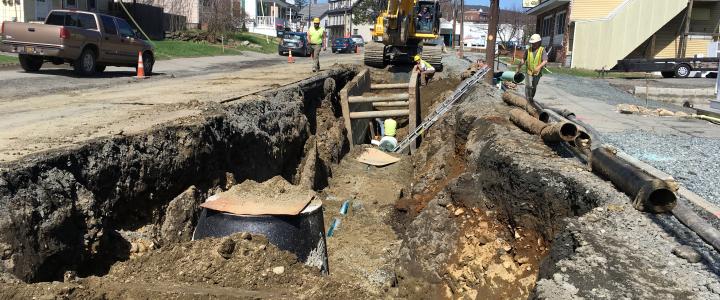
City of Lebanon Meets EPA Consent Decree Requirements by Eliminating CSO Outfalls
Editor’s Note: The following article is an update to a previous EPA article.
With the assistance of multiple loans from the New Hampshire Clean Water State Revolving Fund (CWSRF) and the Drinking Water State Revolving Fund (DWSRF) over several years, the City of Lebanon was able to complete the necessary construction to completely eliminate its Combined Sewer Overflow (CSO) outfalls, therefore taking away the need for the Consent Decree established between the EPA and the City in 2009. CSO outfalls discharge a combination of wastewater and stormwater to nearby surface waters when the combined sewer system does not have the capacity to transmit all the flow of wastewater and stormwater to the treatment plant.
The Consent Decree was officially dissolved in the fall of 2021; meanwhile the City continued towards project completion throughout 2022. Funding from the CWSRF totaled about $32.5 million and $2.2 million from DWSRF.
Before the Consent Decree, the City was discharging nearly 14 million gallons of combined wastewater and stormwater per year from as many as 60 to 70 CSO events. In 2009, the EPA alleged that the City of Lebanon had violated the Clean Water Act saying those discharges into the Connecticut River, the Mascoma River, and Great Brook contained concentrations of E. coli bacteria that caused water quality standard violations. The City of Lebanon completed multiple sewer separation projects over the last decade and spent over $70 million to complete them. In addition to the work required by the Consent Decree, the City took the opportunity to improve all of the infrastructure in the project areas, upgrading sewer and drainage, as well as upgrading water lines; installing granite curbing, asphalt and concrete sidewalks; and performing full-depth road reconstruction.
The EPA implements the Clean Water Act National Pollutant Discharge Elimination System (NPDES) program in New Hampshire but closely coordinated with the New Hampshire Department of Environmental Services (NHDES) on this matter. NHDES was involved in all aspects of the projects as it is responsible for reviewing all wastewater infrastructure projects in the state, as well as provided funding through its CWSRF, which requires project oversight.
Combined sewers were designed to collect both sanitary sewage and stormwater runoff in a single-pipe system. These systems were designed to convey sewage and wastewater to a treatment plant during dry weather. Under wet weather conditions, these combined sewer systems would overflow and often discharge directly into local waterways, causing combined sewer overflows (CSOs). CSOs contain untreated or partially treated human and industrial waste, toxic materials, and debris as well as stormwater. State and local authorities generally have not allowed the construction of new combined sewers since the first half of the 20th century. Most New England cities and towns are working towards eliminating any existing CSOs.




